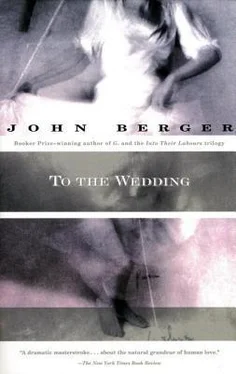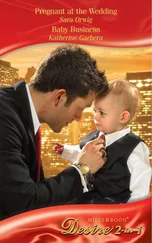John Berger - To the Wedding
Здесь есть возможность читать онлайн «John Berger - To the Wedding» весь текст электронной книги совершенно бесплатно (целиком полную версию без сокращений). В некоторых случаях можно слушать аудио, скачать через торрент в формате fb2 и присутствует краткое содержание. Год выпуска: 2011, ISBN: 2011, Издательство: Knopf Doubleday Publishing Group, Жанр: Современная проза, на английском языке. Описание произведения, (предисловие) а так же отзывы посетителей доступны на портале библиотеки ЛибКат.
- Название:To the Wedding
- Автор:
- Издательство:Knopf Doubleday Publishing Group
- Жанр:
- Год:2011
- ISBN:978-0-307-79420-8
- Рейтинг книги:3 / 5. Голосов: 1
-
Избранное:Добавить в избранное
- Отзывы:
-
Ваша оценка:
- 60
- 1
- 2
- 3
- 4
- 5
To the Wedding: краткое содержание, описание и аннотация
Предлагаем к чтению аннотацию, описание, краткое содержание или предисловие (зависит от того, что написал сам автор книги «To the Wedding»). Если вы не нашли необходимую информацию о книге — напишите в комментариях, мы постараемся отыскать её.
To the Wedding — читать онлайн бесплатно полную книгу (весь текст) целиком
Ниже представлен текст книги, разбитый по страницам. Система сохранения места последней прочитанной страницы, позволяет с удобством читать онлайн бесплатно книгу «To the Wedding», без необходимости каждый раз заново искать на чём Вы остановились. Поставьте закладку, и сможете в любой момент перейти на страницу, на которой закончили чтение.
Интервал:
Закладка:
The band stops and Gino faces Ninon and he says: We can do it, without a word about happiness, can’t we?
She hesitates, then she kisses him full on the mouth, tears of happiness in her eyes.
What shall we do before eternity?
Take our time.
Dance without shoes?
She throws her shoes off the deck. Then, turning back her sleeves and spreading her dress discreetly around her, she sits down and puts her arms under her skirt to unfasten her white lace stockings and unroll them off her legs. Whereupon without music she dances barefoot on the boards which the fishwives at Comacchio have scrubbed so many times that they are as smooth as a tabletop. Dancing like this Ninon is more vagabond than bride. As if some rider had come to take her away on a horse, as the bald man, in the coach going to Venice, had predicted.
Marella and Leila are pouring out more spumante. The singer wipes his head with a towel. The guitarist examines his right hand; there is a smear of blood across his plucking fingers. The drummer is walking alone along the eastern dyke. The stars are out. Dante says: Within its deep infinity I saw ingathered and bound by love in one volume the scattered leaves of all the universe.
Ninon finds her father and kisses him — as if with him and him alone she can be a girl again.
Papa, tomorrow the first day of my married life, will you take me for a ride on your bike?
I brought a spare helmet.
Fast?
Fast, if you want.
I’m never frightened with you.
More villagers will come on to the deck. The musicians will play again. Pairs of old women will dance together so as to feel the music in their bodies one more time.
Music began — all the rembetes know it — with a howl lamenting a loss. The howl became a prayer and from the hope in the prayer started music, which can never forget its origin. In it, hope and loss are a pair.
Why do they have to play so loud? asks a fisherman who has put on an immaculate white vest and on whose shoulder an eagle is tattooed. When I was young we danced to an accordion. It was enough. They’ll go deaf all these young people. Gesù Maria, look at how she dances!
They play loud, says the man in the wheelchair beside him, to keep out the din of the world. That’s the truth.
What? demands the fisherman.
It’s you who are deaf!
Look at her!
The crippled man swivels his wheelchair round to face his habitual opponent who is also his brother-in-law. Today, he repeats, they have to shout down the din of the world! They have to block it out by putting the volume up. He swivels the chair back to watch the dancers with enchantment. Only then can they say what they have to say. There wasn’t the same din when we were young. We didn’t have to block anything out. The world was quiet, wasn’t it? Here it was very quiet.
Gesù! She’s meant to be the bride, isn’t she?
She’s in love! says the man in the wheelchair as if on the point of breaking into song, in love, Raimondo!
More like a tart. Puttana!
Ninon is dancing barefoot with her arms round Gino’s waist and her fingers under his belt. All her braids revolve and twist like games for them both.
When she has her first attack of pneumonia and she is at home in bed after Gino has gone to market, she will pray to God: The world is wicked — how can anybody not see it? — the world is wicked. And Christ is the salvation of the world, her soul will say wordlessly, not was, not will be, is. In a space larger than the universe, the space made by all of us with our eyes shut, all people living, all people who lived, all people who will live, there in the darkest hole, filling a space larger than the universe, he dies and saves. The air is touching my whole body, hurting it. It’s still early, the cars are starting up. Gino will be home at four.
From his stool, the drummer hits constellation after constellation. The guests tell each other they have never been to such a wedding. Ninon raises her arms and puts her hands into Gino’s hair. Both are on tiptoe.
Gino will push her in a wheelchair like the one the fisherman’s brother-in-law has, when she doesn’t any more have the strength in her legs to walk, and Federico will invent and weld on to its armrests a special table so she will be able to eat in the chair.
Now she touches Gino’s cheek and turns to dance alone for him. Poised like a bird facing the wind, she lets herself veer and be swept back over the same spot again and again and again whilst her hands pluck the rhythms from the air.
One night she will say: I am going to die.
So am I, Gino will reply.
Not so soon as me. I’ve done nothing with my life.
You’ve made many people happy.
I want to drink, Gino.
Orange juice?
No. Gin! A whole bottle!
The band is playing Last Friday Drives Monday Crazy . Ninon is in Gino’s arms. The pain in the slow number carries in its heart centuries of irrepressible hope.
In some Italian market town, a mother pushes a pram on her way to the butcher, her legs not yet tanned. She stops to say hello to Marella who peeks into the pram — the hood is up and has a white lace fringe which she cut from her wedding dress to keep the sun out of the baby’s eyes — and Marella makes a chirping noise through her pouted lips and says with a smile: He’s the spitting image of Gino, isn’t he? This, which will never happen, is in the music she’s dancing to on her wedding day.
When time is pulse, as music makes it, eternity is in the gaps between.
She will be reclining under the arcades in the hospital garden and her friend Filippo in his cherry-red velvet cap will look at her with his soft irritated eyes and say: What’s hardest is not being condemned to die. What’s hardest is how we’re old. I walk like an old man. I pull myself up the stairs like an old man. I clutch my stomach like one. Listen to me and shut your beautiful eyes, Ninon. An old fool of eighty, you’d say, stumbling over his words. Between one spring and one autumn we age fifty years. That’s the hardest, and that’s the work of our little troop of diseases, each one of them pitiless. Till they find one of us, Ninon, they’re regular, uniformed illnesses, almost innocent. When they find us they plunder and massacre. And Filippo will look at her, his hands trembling, his eyes tender. They don’t attack us, they hate us, Ninon. These ones — the SIDA cases — can’t defend themselves, the illnesses tell each other, they’re shit, these ones. And Filippo will take off his cherry-red cap and put it back on his head at a more debonair angle than ever. And so we age so terribly. For the rest, don’t worry, love, it’s all right. For the rest, Filippo will say sadly, we’re pure light.
Ninon’s front, from chin to toe, is touching Gino’s and it is she who moves his legs, with her arms hanging straight down.
She will try to comb her hair and each morning she will ask for her wristwatch to be put on, she will have a morphine drip and with her eyes closed her skin will feel his hand stroking away the fear and his hand will feel the warmth which is all that will remain like a kiss around the bones of her loved body. She will weigh seventeen kilos and her eyes, with their long lashes in their dark hollow sockets, will gaze into his.
Through a cascade of sounds in which everything slows down, the singer, who had a fistfight last night, screams out: “… drives Monday crazy.”
Let’s do an eel, Gino, we can dance the eel! Hop from boulder to boulder, lay me down in the field and follow the bank, skateboard down the steps of the station where our friends are on strike, hip-hop into the van and leap with all the gear into bed, squat in the café behind the market, climb the pyramid, twist in my arms sweet, cut a rug down the train with the dead soldiers who have come to our wedding, tear along the corridor of offices that don’t want to know us, fly between water and sky across my mouth, which said I do, I take this man to dance with, squat so our thighs make a step and stepping on the step you can reach the light in our kitchen to change the bulb, dance till our guests are gone, do the eel again, for ever and ever, Gino.
Читать дальшеИнтервал:
Закладка:
Похожие книги на «To the Wedding»
Представляем Вашему вниманию похожие книги на «To the Wedding» списком для выбора. Мы отобрали схожую по названию и смыслу литературу в надежде предоставить читателям больше вариантов отыскать новые, интересные, ещё непрочитанные произведения.
Обсуждение, отзывы о книге «To the Wedding» и просто собственные мнения читателей. Оставьте ваши комментарии, напишите, что Вы думаете о произведении, его смысле или главных героях. Укажите что конкретно понравилось, а что нет, и почему Вы так считаете.












